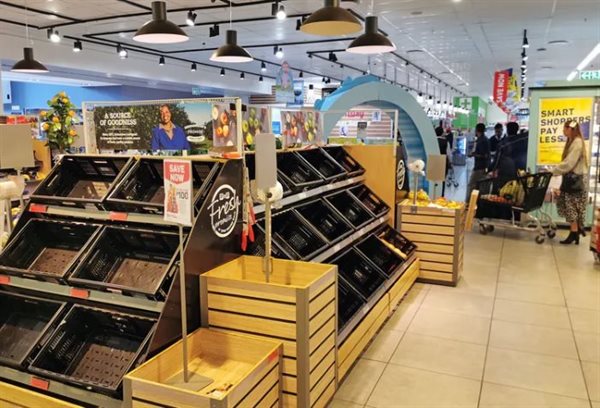Trending



 Sabre EMEA 2024 Awards: Razor PR, Retroviral top SA agenciesDanette Breitenbach
Sabre EMEA 2024 Awards: Razor PR, Retroviral top SA agenciesDanette Breitenbach

Elections 2024
Jobs
- Account Executive - Dubai Dubai, United Arab Emirates
- Sales Consultant Bushbuckridge
- Sales Representative - Labels and Packaging Midrand
- Sales Representative Bushbuckridge
- Field Sales Representative Nelspruit
- Sales and Marketing Consultant Nelspruit
- Account Sales Agent Nelspruit
- Area Sales Consultant Bushbuckridge
- Outbound Sales Associate Nelspruit
- Promoters Bushbuckridge
The case for avoiding price controls in times of crisis: they don't work

In South Africa, the trade and industry minister introduced regulations to strengthen competition and consumer law enforcement against so-called excessive or unfair pricing during this period of national disaster.
The pricing regulations do not regulate prices explicitly, but seek to limit the extent to which prices respond to demand and cost factors during the disaster period. This has given rise to a flood of consumer complaints and a number of investigations by the competition authorities.
Tighter price regulation is popular in periods of extraordinary economic stress, such as war and following natural disaster. Edwin Cannan, who studied the efficacy of price controls during the first world war, described social views during disaster periods as follows:
(People) are perfectly convinced that the rise with which they have to contend for the moment is unnatural, artificial, and wholly unjustifiable, being merely the wicked work of people who want to enrich themselves, and who are given the power to do so not by the economic conditions… This has been so since the dawn of history… but no amount of historical retrospect seems to be of much use. The same absurdity crops up generation after generation.Basing pricing policy on such sentiments will be counterproductive in the current context, as price is a signal of underlying demand and cost.
Price control is an ancient form of regulation. Adam Smith was the first to criticise price regulation from an economics perspective, in his famous book The Wealth of Nations. Smith’s insight – which forms the basis of modern economists’ views of price control – was that attempts to arrest price increases during periods of scarcity (due to war or drought) are not helpful and lead to famine. Freezing price changes – or seeking to reduce prices below market-determined levels – is likely to maintain demand at levels which supply cannot meet.
Put differently, prices regulate demand and supply, resulting in smaller shortages.
Supply and demand
When Covid-19 hit South Africa, the country saw an unprecedented surge in demand for basic food and other essential items. This surge often resulted in empty shelves in grocery stores. But shortages were short-lived, as grocery supply chains responded, resulting in increased frequency and volumes of products supplied. There has also been an increased supply of certain essential items, such as hand sanitisers, because of the temporary entry of other manufacturers.
This swift supply response to the surge in demand explains why prices have not accelerated across the board. It is true that some retailers in selected markets, enjoying market power, have been able and willing to significantly increase prices. Yet the fear of prosecution by competition authorities may well have dampened these incentives.
More important, given current economic conditions, broad-based demand-driven price increases are not likely to persist.
This would support the government’s strategy to cooperate with the agricultural, food processing and grocery retail sectors, to ensure that supply chains for food and other essential household items remain functional. This is the surest way to guard against significant price increases during the crisis.
What about the future?
One could still ask whether price controls would not be merited in future. What if the pandemic causes greater supply stress in the coming months, perhaps damaging supply chains for critical products – such as medical products?
A key insight of Adam Smith is that enforcing lower prices in markets experiencing surging demand and stagnant supply does little to support consumers. Price control cannot address scarcity. Fixing prices at lower levels will merely enforce existing demand patterns. This will result in worse shortages for many consumers down the line.
Indeed, Adam Smith directly linked famine, during times of drought, to price controls limiting increases in the price of basic foodstuffs.
If supply should become severely constrained, at least partly because of sharp increases in the cost of inputs acquired via international supply chains, it is also not clear how controlling prices would provide suppliers with incentives to increase output.
The government appears to accept this. The regulations on excessive pricing view cost-based price increases as justified.
Even so, whether because of interaction with the competition authorities or because of uncertainty around enforcement of the regulations, many firms have committed to halt price increases.
Yet prices are the signals on which the market economy relies to direct resources. Supply pressures and hence costs may well increase as the lockdown continues. It is critical that price signals be allowed to encourage a supply response. Longer-term constraints on price increases will not help consumers or alleviate shortages.![]()
Source: The Conversation Africa

The Conversation Africa is an independent source of news and views from the academic and research community. Its aim is to promote better understanding of current affairs and complex issues, and allow for a better quality of public discourse and conversation.
Go to: https://theconversation.com/africa











